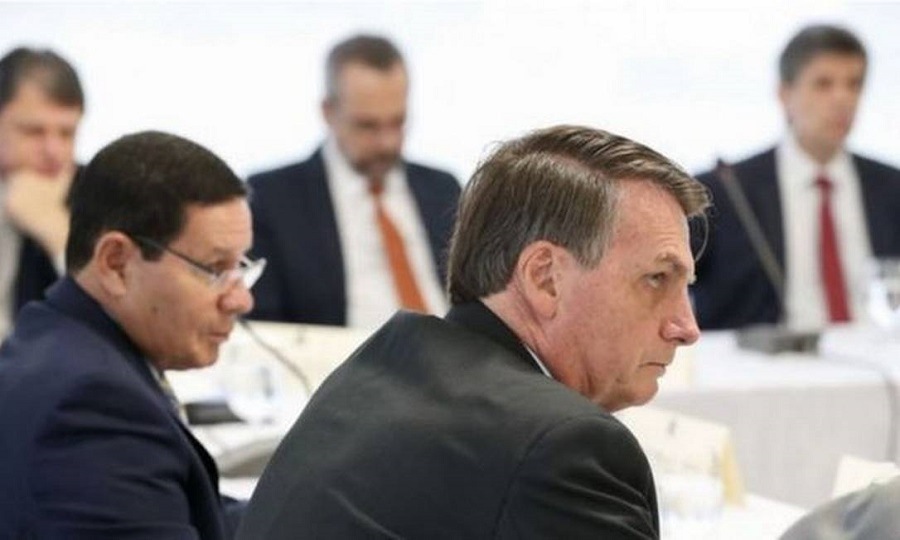RIO DE JANEIRO, BRAZIL – In the month when the coronavirus health crisis got out of control, raising Brazil to second place in the world in the number of cases, and in which signs of his political interference in the Federal Police to protect his family are growing, President Jair Bolsonaro sees his government’s disapproval increase: 58.1 percent of Brazilians rate the administration as poor or terrible, points out the Atlas Político survey released on Wednesday.
However, the President’s personal image does not follow the same deterioration, an indication that the country’s leader retains backing in his electoral bases.

Since the survey conducted on April 25th, just after Minister Sérgio Moro announced his resignation and accused the President, Bolsonaro’s performance approval and disapproval rates have remained stable, considering the error margin of two percentage points.
In the new survey, Bolsonaro maintains a high disapproval rate (65.1 percent now, compared to 64.4 percent a month ago) and experiences a slight increase in approval (32.9 percent now, compared to 30.5 percent in April).
The survey – which interviewed 2,000 people between Sunday and Tuesday, through a sample of the adult Brazilian population – is the first conducted after the release of the cabinet meeting video that supports evidence that the President tried to change the Federal Police command to prevent investigations into his family and allies, a suspicion subject to investigation by the Federal Supreme Court (STF).
The video also reveals official neglect of the pandemic and highlights the dynamics of government discussions, with the use of profanity, insults to authorities and other powers, and anti-minorities and anti-environment agenda.
It was during the time between the two surveys that Bolsonaro gave one of his most controversial statements about the pandemic, when on April 28th he was asked about the increase in the number of deaths. “So what? I’m sorry. What do you want me to do?” he told reporters.
Since then, the President has raised criticism of the social isolation measures implemented by local governments and stepped up support for the reopening of the economy, mediating the lobby of businessmen who have expressed concern over the “death of CNPJs (National Registry of Legal Entities)” as a result of the crisis.
The fact that this discourse does not undermine the President’s image may be in line with the loss of popular support for measures to contain the virus, such as closing businesses and schools.
Although 72 percent of respondents agree with this type of policy today, support has dropped ten percentage points since March, while the rate of those who say they disagree with isolation has increased from 13 to 24 percent over the same period.

Political scientist Andrei Roman, the creator of the Atlas Politico, points out that there is a wide divergence in the assessment of how the pandemic was conducted among Bolsonaro’s voters and non-voters in the 2018 runoff. If among those who voted for the President the approval for isolation is divided (47 percent say they approve him, the same percentage of disapproval), this percentage hikes among voters of leftist Fernando Haddad (96 percent).
“There is an ideological polarization that increases the distinction between these two groups,” he says. “This is a key dimension for reading the data [on support for isolation measures]”.
According to the researcher, the difference between the stable personal approval of Bolsonaro and the drop in approval of his government may suggest that a portion of the population had hopes for the administration, even though they disliked the President’s style.
The downfall of another Health Minister during the period – Nelson Teich – seems to have influenced this change in perception.
Moro loses support
A key player in the investigation into Bolsonaro, ex-Minister Sérgio Moro has lost support since he left the government and, for the first time, is perceived negatively (43 percent) compared to his positive assessment (42 percent), considering the error margin. For Roman, although the former judge’s support is still considerable and greater than that of the President himself, Moro is now facing his worst position since the height of Lava Jato. In April, the ex-Minister’s approval reached 57 percent.
According to the researcher, the drop in support for the ex-Minister is a natural consequence of his resignation and is due to the detachment of part of Bolsonaro’s inner circle.
Ex-Minister of Health Luiz Henrique Mandetta retains his high popularity even after over a month away from the health crisis’ command: 52 percent of respondents perceive him positively, compared to 63 percent in April, while 29 percent perceive him negatively.
Dictatorship and impeachment
The survey also gauged the opinion of Brazilians on the potential return of a military dictatorship in Brazil, at a time when military intervention in the country is on the agenda of pro-Bolsonaro rallies. According to Atlas Político, 83 percent of the population are against the regime and 9 percent are in favor.

Support for the President’s impeachment has been growing since March and stands at 58 percent of respondents, compared to 36 percent against it.
Source: El País

